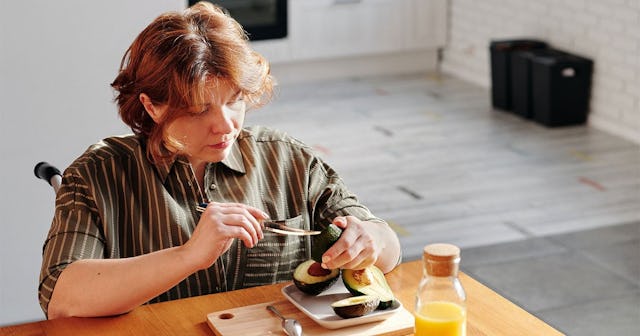I'm Not Baking Fresh Bread Right Now, And That's OK

I have to admit, by week three I’d started to compare myself with others—people baking bread in their white minimalist kitchens, their kids learning new languages and instruments, people organizing closets, and starting new exercise programs.
RELATED: Kids’ Baking Sets & Junior Cookbooks For The Aspiring Baker Or Chef In Your Fam
That first two days I was “on.” I had us up at the usual time, served both my daughter and myself a hot breakfast at 7:30 am and even had us take a brisk morning walk in place of our usual walk to school. I rang a little bell at 8:30 am and we said the Pledge of Allegiance. I gave “morning announcements.”
By the second night, I awoke at 3:30 am having a severe panic attack … something I am prone to and struggle with in a non-pandemic year since losing my husband suddenly when I was 34 and my daughter was not yet two. That was my body’s reminder to me to slow down and just get through. I spent the next day under a soft blanket watching Korean dramas. After that first week, I gave up all aspirations of trying to make this “new normal” feel normal. Because it isn’t, and it won’t be for a very long time. What we’re going through together, on a global scale, has been called a form of grief, and it is.
In early, raw grief, right after my husband died, no one expected anything of me. I lived in a grief cocoon where my bed became my sanctuary. Beside it was an overflowing basket of sympathy cards/checks that I would eventually reply to with thank you notes … but not for many months. Sitting in bed, I ate my mother’s famous Christmas cookies for breakfast on my husband’s birthday in December of that first year; it was the perfect ritual. Even though I had no TV in our apartment because I’d been strictly adhering to the no screens before age two guidelines of the APA, my toddler began watching DVDs given to me by a neighbor every morning beside me on the bed while I struggled to get up.
I did not drive anywhere for weeks because I did not trust myself to concentrate. I was not expected to cook — our church brought me meals for months. I was not expected to be productive in any real way. I showered, ate what I could, and took care of my daughter. Besides that, it was enough just to try to process the news — all of the shocking ways in which my life had abruptly changed. So why in a time of global grief would I expect myself to bake fresh bread?
While grieving is universal, every person’s grieving process is as unique as the relationship and loss they’ve suffered. Even though we’re all going through the same global crisis, all quarantines are not created equal. Some of us are single parents spending our day with a child or children with little to no adult contact. Some of us have four children who are entertaining each other amidst arguing. Some of us have elderly parents to care for. Some of us have family members on the frontlines who are risking their lives and living in constant fear of contaminating their family members.
Also, because we grieve who we are, our reactions to the same pandemic will look different. A friend who is a fitness teacher and a dancer is making and sharing brief fitness videos online each day. A woman in town is organizing activities to keep kids cooped up at home busy. Yes, some people are baking bread and cakes and muffins. I’m a writer, so I write.
I’ve also been cooking three meals a day. I even baked a banana bread and some muffins. I do try to get outside every day, and I’ve been jump roping on my driveway while my daughter sweeps nothing in particular off our steps. The first week I even posted a cute guide for well-being my daughter and I came up with online myself. Maybe people have been looking at me and comparing themselves. Who knows? In light of what’s going on right now, none of this matters.
As Joyce Carol Oates wrote in the epitaph of her memoir, A Widow’s Story, “Of the widow’s countless death-duties there is really just one that matters: on the first anniversary of her husband’s death the widow should think I kept myself alive.” I think the same applies during a pandemic. At the end of all this, that accomplishment wouldn’t be a bad epitaph to have.
This article was originally published on